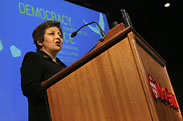Ebadi on democracy
"Democracy is a historical process. It's not an event that happens overnight. It's not a gift. Democracy is the result of 24-hour efforts of people who believe in freedom."

Shirin Ebadi, Nobel Peace Prize winner
Owen Egan
The Iranian lawyer and human rights activist Shirin Ebadi forthrightly addressed her attentive audience, who tuned into headsets to hear English and French translations of the 2003 Nobel Peace Prize–winner's speech, "Democracy: The Precondition of Peace." Speaking in Farsi, Ebadi was at McGill recently to present the Beatty Memorial Homecoming Lecture on October 16 in the Centre Mont-Royal.
During a press conference the following Monday, Ebadi addressed questions about her work in Iran and about the West's affect on the current situation in the Middle East. When asked what role Western countries might play in the fulfilment of the democratization process, Ebadi had a decisive answer. "Human rights are not established by throwing cluster bombs on people. You cannot introduce democracy to a country by using tanks."
At both events, her message was clear: Iranian culture and the potential for democracy and human rights in Iran are threatened from within and without by fundamentalist interpretations of Islam and colonizing global forces.
Islam, Ebadi insists, is not intrinsically incompatible with democracy and human rights. For example, Indonesia, the most populous Muslim country in the world, has had until only very recently a woman as its prime minister.
Ebadi pleaded to the press to "portray the situation in Iran as it is — no darker or brighter."
During her lecture, Ebadi named a number of human rights activists who died or were imprisoned for their beliefs. One of these is Iranian-Canadian photojournalist Zahra Kazemi, who died in Iranian custody after taking photos of a prison in Tehran, Ebadi said. "Her death voiced the truth that did not fit in her camera." Ebadi is taking legal action in this case on behalf of Kazemi's family. If the case is still not heard once every legal channel within Iran has been explored, she is prepared to take action in international courts.
Many of what came to be known as the "chain deaths" of human rights activists in the '70s, '80s and '90s will go unsolved, but Ebadi is pursuing the cases of four murders carried out by Information Office employees. Her goal is to get to the bottom of who ordered the murders.
Who is ultimately responsible for the continuation of the tyrannical dictatorship Ebadi describes as hiding behind a fundamentalist interpretation of Islam? At her lecture she was asked who is in power in Iran, the elected president or the supreme leader? She drew laughter from an otherwise earnest audience, replying that she has lived with this government for 25 years, and she still doesn't know.
This much is clear, however: the youth of Iran, in particular, are unhappy with their prospects there, and are leaving in droves. Jobs are few and far between, and the cost of living is rising.
Ebadi does not lay blame on any particular doorstep, emphasizing instead that bringing about and maintaining democracy is the responsibility of every citizen. A homeowner who leaves the front door unlocked and is robbed is just as guilty as the thief, she says. "People who distance themselves from their government are the same."
Some governments, though, have ways of encouraging citizens to keep to a healthy distance from the inner workings of the powers that be.
In an interview with the Reporter, Negar Tavassolian, Ebadi's daughter, who is doing her masters at McGill, explained that in Iran, "the law says that political cases should be treated separately; they're different from other crimes." Yet there is no legal definition of what is or isn't a political case. The end result is that political cases are defined as nonpolitical, and the government can try them as they wish. According to the Iranian government, she said, "There have been no political prisoners."
Aside from economic hardship and the threat of reprisal for any political actions, women and girls in Iran deal with anxiety on a day-to-day basis. Said Tavassolian, "Even in universities, you worry. Maybe someone will ask, 'Why are you wearing a short coat?' You have to wear a long coat. In the streets you never know if someone will come and take you away because you are wearing makeup." Sometimes officials will want money in exchange for letting a woman or a girl go. "But sometimes they can take you away."
Tavassolian's assessment of these officials is surprisingly sympathetic. If they have no conscience, it's in part because they have their own problems. "They're not paid enough," she said simply.
In theory, young Iranian women are free to follow in Ebadi's path, if they have her will and nerve. In a 1999 interview, Ebadi described her situation this way: "Any person who pursues human rights in Iran must live with fear from birth to death, but I have learned to overcome my fear."
Ebadi herself was held in solitary confinement for a month for distributing a videotaped confession of an insider who claimed government officials were ordering reprisal attacks on reform groups. Tavassolian said, "They came and took her away before she was convicted of anything. We didn't know where she was." Once the family had contact with Ebadi, her cool-headedness reassured them. As law professor and press conference moderator Stephen Toope said, Ebadi is "a person of quiet, steely determination."
Tavassolian — who in the most good-humoured way possible describes herself as pessimist — doubts she will see significant change in Iran in her lifetime. But Ebadi, closing her lecture, described a vision of an Iran that complies with democracy and human rights, and of a world where "humans see the pain and agony of others as though they were their own."
"I am dreaming," she concluded. "I believe dreaming is an important part of human history. Our challenge today is to dream."
